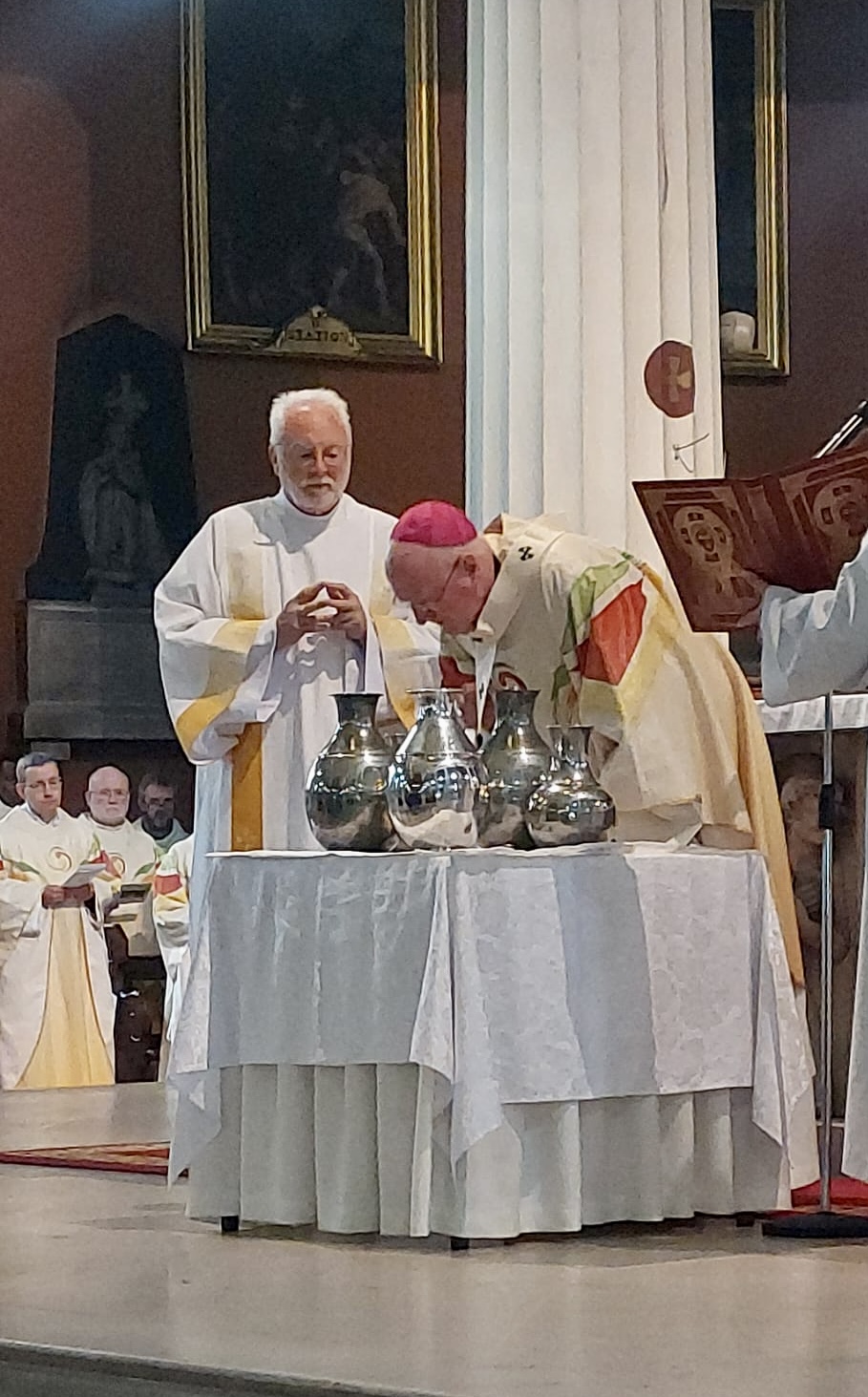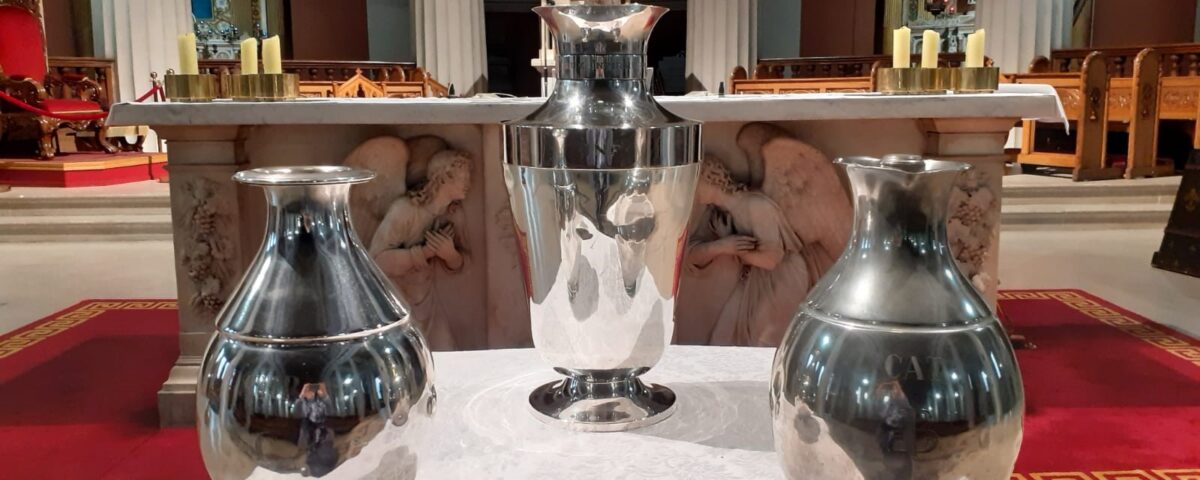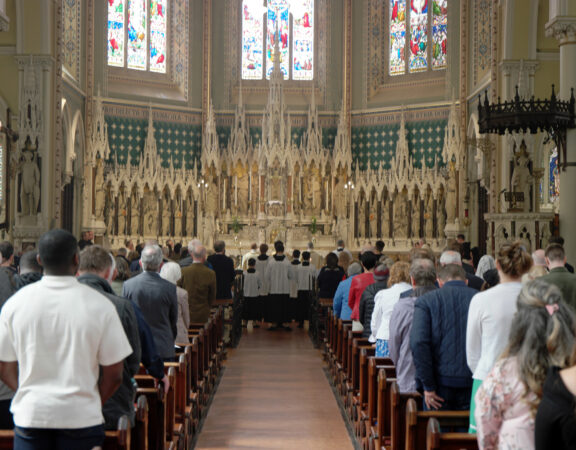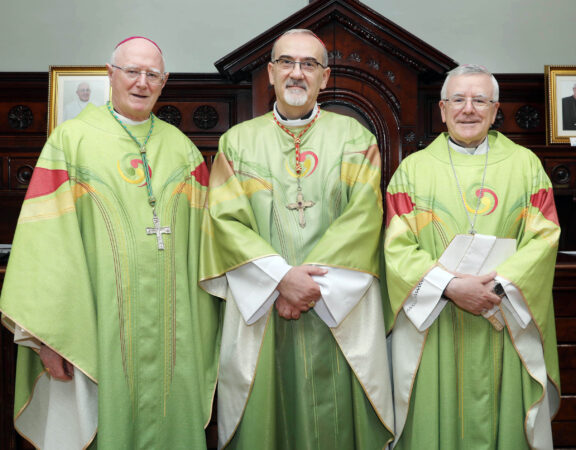Chrism Mass
St Mary’s Pro-Cathedral
Thursday, 6th April 2023
Homily of Archbishop Dermot Farrell
“The spirit of the Lord has been given to me, for he has anointed me. He has sent me to bring the good news to the poor, to proclaim liberty to the captives, and to the blind new sight.” (Luke 4:18)
I put before you two words today: ownership and disturbance!
Jesus makes God’s Word his Own
Jesus takes ownership of the word he reads: “And he opened the book, and he found the place where it is written, “The Spirit of the Lord has been given to me…” When he finishes, he finishes not with “That is what Isaiah says,” or “Hear then the word of the prophet”, but with, “Today, this Scripture if fulfilled in your hearing …”
Jesus has a deep identification with the Word of God: “the Spirit is given to me, he has sent me. Not, “the Lord says I should go.” But, “he has sent me.” As if to say, ‘This is where I am. He sends me. I go.” The depth of Jesus’ ownership of the word of the prophet Isaiah is noteworthy. He makes Isaiah’s word his own. This is who I am. This text does not force him down a road he does not want to go. He embraces the mission that Isaiah expresses. Today, we might say, he owns the mission Isaiah puts before him.
At this Chrism Mass, when we reflect on our priesthood and renew our promises, I think there’s something worth reflecting on in Jesus’ ownership of the initiative of God.
The word of God is God’s overture to us. God reaches out to us, and speaks to his people. God speaks to us in many ways: in the Scriptures, in Jesus, in creation, and God speaks through the way he guides his people through time. It is this final aspect that I wish to focus on this morning. Our ownership of the way God guides his people through time is essential to our fulfilment, our peace, our wellbeing; in a real sense, our salvation. Because what is salvation, if not the life God offers us, life to the full (see John 10:10).
The Word that Disturbs our Peace
This, however, is but one side of the equation. The word that God gives, in particular the word that is his Son, is not just a word of consolation or peace. It is also a word that ‘disturbs the peace.’ God’s word brings in its wake upset … confusion. Look at how this is happening in the Gospel we have just heard: Jesus’ neighbours are disturbed by how he sees things; they are unsettled by how he speaks and acts.
It is no different today. When the Lord is at work, there will be upset, confusion, disturbance. The way of the resurrection and the way of the cross go hand in hand. I doubt if Pope Francis’s recent words in the cathedral at Juba (South Sudan) will have met with universal welcome! Like Jesus the prophet, he’s disturbing the peace.
Our first duty is not to be a Church that is perfectly organised, any company can do this, but a Church that, in the name of Christ, stands in the midst of people’s troubled lives…walking in the midst of and alongside our people, learning to listen and to dialogue, cooperating as ministers with one another and with the laity. Let me repeat this important word: together. Let us never forget it: together. (Address, St Theresa’s Cathedral, Juba, South Sudan, 4th February 2023).
In our diocese, the Building Hope initiative involves people and priests creating a joint mission—a mission together—in which new pastoral areas will comprise a number of parishes in partnership. This necessarily involves a ‘letting go’ of the past and an embrace of what is to come. For this pastoral initiative to be successful, there needs to be a shared appreciation of the rationale, and a shared conviction of the necessity to embrace change. We are embracing a renewed way of being Church. Sometimes people say it is a new way of being Church, but this ‘being together’ has always been—and will always be—at the heart of being Church. Of course, there have been tensions, and there will be differences. But tensions and differences are signs of a real living relationship between real people. It is not the tensions that are the real problem; but the denial of them that is the problem: the failure to engage with those who are different to us, who see things in a different way, and the refusal to see that there can be different valid responses to whatever undermines the gospel.
Rather than viewing change as a negative, the real challenge is to see change as an opportunity for creative ways to sustain a viable and vibrant future for the faith communities of our Diocese.
Not just change but conversion
As Bishop, my call to you, the priests and deacons of this diocese, is to own this change, to own this way. This demands a change on all our parts. Let us not be under any illusion as to the demand and depth of that change. In fact, it might be more accurate to call it a conversion. Embracing a synodal church demands a conversion. “To be converted is to learn ever anew how to take the gospel seriously,” said Pope Francis to the Curia last December. “What was the [Second Vatican] Council,” he continued, “if not a great moment of conversion for the entire Church?” and he called to mind the words of Saint John XXIII: “The gospel does not change; it is we who begin to understand it more fully” (Christmas Greeting to the Curia, 22nd December 2022)
This is the heart of Synodality: the process of making Christ’s way our own. This process has no “best before” date, as we see in Holy Week, when we are confronted with the cost of following Christ. It was a long and disconcerting road for the apostles: their running away, Peter’s denials, Judas’s plans, all bear witness to how hard it was for Jesus’ closest followers to make his way their own. Only with the companionship of the Risen Lord, the Bread of Life, may we escape the illusions of self-sufficiency, and the curious infallibility that can come from the demands of ministry over a lifetime. It is a long road, but those who take it do change.
Embracing Conversion—Owning God’s Way
The road of change is a road of conversion, and conversion is to be seen in the way our lives change. Change does not happen in the twinkling of an eye, but is the fruit of a long process. It is a grace, a gift in God’s own time. We are “liberated from rigidity and compulsiveness,” re-discover a new freedom, experience the capacity to surrender ourselves to our vocations, and come to trust anew in God’s closeness and tenderness. This is not some short programme, some well-defined project for a week or a month. No! This is the work of a lifetime. “Only those who continue in their [journey of] conversion truly know God.” (see André Louf, Tuning into Grace: the Quest for God [London: DLT, 1992], 63). There is much at stake.
Putting Flesh on Conversion—The Marks of Conversion
With so much at stake, it is important to be as concrete as possible. Otherwise, the grace that wells up within us, risks being lost, like water poured into sand. From the many signs of fruitful change, signs of owning “the work that God began in us,” I wish to underline three:
First: Openness to the voice and views of others. There are many members in the one body: the living Church is a more a like choir than an assembly of soloists. Genuine openness is a sign that the Spirit is at work.
Second: A Growing Realisation of our weakness, and of our own limits, and a corresponding increase in our hope in God’s goodness, mercy, and forgiveness. Like Christ, we have an increasing capacity to say, “into your hands, I commend my spirit.” Into your hands I place my life, into your hands I place this homily… this meeting …
Third, Space for the Lord—particularly in quiet and silence: learning to wait for God, and trusting in him, especially when our dreams and hopes begin to fade.
There are others: patience with God, a deepening sense of mystery, an increasing acceptance in where God is bringing us, a joy in the graces we come to see. However, openness to others, acceptance of our limitedness, and making space for the Lord have a primacy, in any time, but especially now.
Communicating the Word that Saves (John Paul II)
In his radical wisdom, Pope Saint John Paul II saw that people’s “thirst for Christ — whether conscious or not—cannot be quenched with empty words. Only authentic witnesses can communicate in a credible way the word that saves.” (Letter to Priests, Holy Thursday, 2001, §3) May our ownership of what God is doing in our lives, in the Church, and in the world, “call us more deeply to the Upper Room … to receive from the Lord’s hands the Eucharistic Bread, and to break it as food for the People of God on their pilgrim way home through time. [Letter to Priests, Holy Thursday, 2004, §3]
May Christ the High Priest become more and more, the Bread of our lives. Amen
+Dermot Farrell,
Archbishop of Dublin








